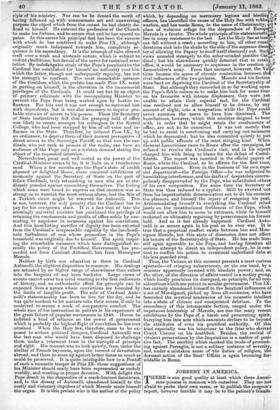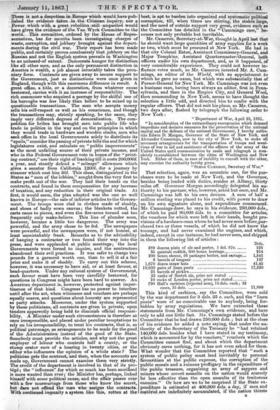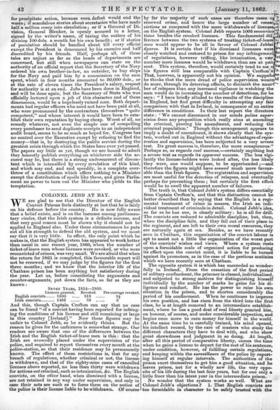JOBBERY IN AMERICA. T HERE is one good quality at least
which these Ameri- cans possess in common with ourselves. They are not afraid to probe their own sores, or to publish the surgeon's report, however terrible it may be to the patient's friends. There is not a despotism in Europe which would have pub- lished the evidence taken in the Crimean inquiry, nor A Power which with a great rebellion still unquelled would have given the evidence of the Van Wyck Committee to the world. This committee, ordered by the House of Repre- sentatives, has for months been investigating charges of waste, corruption, and jobbery brought against the depart- ments during the civil war. Their report has been made public, and certainly proves conclusively that jobbery on the Russian and not the English system prevails in Washington to an unheard-of extent. Democrats hunger for distinction like all other men, and as the only permanent distinction in America is wealth, a job almost invariably takes the pecu- niary form. Contracts are given away to secure support to the Government, just as distinctions were once given in England, though with this enormous difference in result. A great office, a title, or a decoration, from whatever cause bestowed, carries with it an increase of responsibility. The rich commoner who acquired a peerage by the skilful use of his boroughs was less likely than before to be mixed up in questionable transactions. The man who accepts money sells his self-respect as well as his conscience, and though the transactions may, strictly speaking, be the same, they imply very different degrees of demoralization. The com- petition for bribes has brought men into public life who trade in politics in the way and on the principles in which they would trade in hardware and wooden clocks, men who seek office in the local Governments solely to distribute its "spoils," consider the passing of private bills the end for which legislatures exist, and calculate on "public improvements" as the most unfailing source of their private income, and who in the Federal Government vote in hopes of the "print- jug contract," use their right of franking till it costs 200,0001. a year, end stoutly defend a "mileage" allowance which gives a senator from California 12001. .for a journey by steamer which cost him 30/. This class, distinguished in the States as "men of the lobbies," sought from the very first to make profit out of the war. They laid their hands on the contracts, and found in them compensation for any increase of taxation, and any reduction in their original trade. At first, it would seem, the plan adopted was the one so well known in Europe—the sale of inferior articles to the Govern- ment. The troops were clad in clothes made of shoddy, and shoes of badly sown canvas ; the blankets rotted, the carts came to pieces, and even the fire-arms turned out too frequently only make-believe. This line of plunder soon, however, became a little too dangerous. The army was powerful, and the army chose to be fed. The newspapers were powerful, and the newspapers were, if not honest, at least unmistakably frank. Remarks as to the advisability of hanging a contractor or two found their way into the press, and were applauded at public meetings ; the local Governments were forced to inquire, and the contractors abandoned their evil practices. It was safer to charge two pounds for a garment worth one, than to sell it at a fair price and make it of shoddy. To carry out this scheme, however, it was necessary to have aid, or at least favour, at head-quarters. -Under any rational system of Government, such favour must have been very carefully bestowed, for questions in Congress might have been hard to answer. An American department is, however, protected against imper- tinence of that kind. Congress has no power to interfere until after the act, when witnesses and vouchers are perhaps equally scarce, and questions about honesty are represented as party attacks. Moreover, under the system supported by these politicians, all contracts are given in private, open tenders apparently being held to diminish official responsi- bility. A Minister under such circumstances is therefore at once irresponsible, and placed under peculiar temptations to rely on his irresponsibility, to treat his contracts, that is, as political patronage, as arrangements to be made for the good of the Administration instead of the good of the State. Somebody must provide the articles, and why not the great employer of labour who controls half a county, or the stump orator sure of a hearing in twenty cities, or the editor who influences the opinion of a whole state ? The politician gets the contract, and then, when the accounts are made up, Government cannot examine them very strictly. The credit of the department is involved in that of its pro- tege ; the "influence" for which so much has been sacrificed is more wanted than ever; the Minister has, perhaps, linked himself with some political cause, and the affair passes over with a few murmurings from those who know the secret, but dare not offend the man who assigns the contracts. With continued impunity a system like this, rotten at the best, is apt to harden into organized and systematic political corruption, till, when times are stirring, the stakes large, and the need of outside support very great, evidence such as the Committee has detailed in the Cummings case," be- comes not only probable but inevitable.
Mr. Cameron, Secretary-at-War, thought in April laat that he should want large quantities of army supplies for `a week or two, which must be procured at New York. He had in that city Colonel Eaton, Assistant Commissary-General, and Major Tompkins, Assistant Quartermaster-General, both officers under his own department, and, as it happened, of very considerable experience. They could not however in- fluence votes much, so Mr. Cameron invested Mr. it. Cum- mings, an editor of the World, with an appointment to which he gave no name, but which was substantially that of Purser-General for New York. Mr. Cummings was not even a business man, having been always an editor' first in Penn, sylvania, and then in the Empire City, and General Wool, then commanding in New York, seems to have thought the selection a little odd, and directed him to confer with the regular officers. That did not suit his plans, so Mr. Cameron, two days after, flashed by telegraph the following order tA; New York : "Department of War, April 23, 1861.
"In consideration of the extraordinary emergencies which demand immediate and decisive measures for the preservation of the natioeal capital and the defence of the national Government, I hereby autho- rize Edwin D. Morgan, Governor of the State of New York, and Alexander Cummings, now in the city of New York, to make all necessary arrangements for the transportation of troops and muni- tions of war in aid and assistance of the officers of the army of the United States until communication by mails and telegraph is com- pletely re-established between the cities of Washington and New York. Either of them, in case of inability to consult with the other, may exercise the authority hereby given. "Spam CAM:ERON, Secretary of War."
That selection, again, was an eccentric one, for the pur- chases were to be made at New York, and the Governor, besides being leaded with duties, resides at Albany, thirty miles off. Governor Morgan accordingly delegated hi o au- thority to his partner, who, however, acted but once, and Mr. Cummings was left to his own devices. A sum of half a million sterling was placed to his credit, with power to draw on his own signature alone, and expenditure commenced. Mr. Cummings drew, he says in his evidence, 250,000 dolts., of which he paid 90,000 dols. to a committee for articles, the vouchers for which were left in their hands, bought pro- visions of a hardware-man whom he had never seen before, pur- chased two or three vessels, of which he did not know the tonnage, and had never examined the engines, and which, indeed, except in one instance, he had never seen, and shipped in them the following list of articles :
Dols.
289 dozens pints of ale and porter, 1 dol. 87e. 526 35 quintals codfish, 300 boxes herrings 214 200 boxes cheese, 26 packages butter, and cartage 1,541 6 barrels of tongues 127 1,670 dozen straw hats 41,45 19,630 pairs of linen pants 17,220 23 barrels of pickles 23 casks of Scotch ale, price not stated 10 casks of London porter, price not stated 790 Hall's carbines (rejected arm), 15 dols. each; 35 cases, 35 dols. 11,890
This kind of carbines,, say the Committee, were sold by the war department for 3 dols. 35 c. each, and the "linen pants" were of no conceivable use to anybody, being for- bidden by' army regulations. We have extracted these statements from Mr. Cummings's own evidence, and have only to add one little fact. Mr. Cummings stated before the Committee that he had drawn 250,000 dole. ; but at the close of his evidence he added a note saying, that under the au- thority of the Secretary of the Treasury he "had retained 140,000 dols. besides what I have stated in my testimony, which is accounted for by the vouchers," vouchers which the Committee cannot find, and about which the department obviously cares nothing, for it has not even asked for them. What wonder that the Committee reported that "such a system of public policy must lead inevitably to personal favouritism at the public expense, the corruption of the public morals and a ruinous profligacy in the expenditure of the public treasure, organizing an army of sappers and miners whose covert assaults on the nation would scarcely be less effective than the open assaults of its traitorous enemies." Or how are we to be surprised if the State ex- penditure is estimated at 400,000 dohs. a day, if men and materiel are indefinitely accumulated, if the nation thirsts for precipitate action, because even defeat would end the waste ; if scandalous stories about secretaries who have made half a million creep into circulation; or if a General of Di- vision, General Blenker, is openly accused in a letter, signed by tbe writer's name, of taxing the sutlers of his divisiop. 100 dots. a month for his own benefit ; or if stories of peculation should be bandied about till every official except the President is denounced by his enemies and half discredited by his friends. Half; perhaps all, of these tales are unjust as far as the heads of departments are concerned, but still when newspapers can state on the authority of an official report that the Secretary of the Navy ordered his own brother-in-law, an outsider, to buy ships for the Navy and paid him by a commission on the sum spent, which in four months amounted to 90,000 dais., or at the rate of eleven times the President's salary, respect for authority is at an end. Jobs have been done in England, and will be done again, but the Secretary of State who was officially lectured upon a job of this character and of these dimensions, would be a hopelessly ruined man. Both depart- ments had regular officers who need not have been paid at all, who were pronounced by the contractors themselves "quite competent," and whose interest it would have been to esta- blish their own reputation by buying cheap. Worst of all, no remedy whatever, not even the simple one of compelling every purchaser to send duplicate receipts to an independent audit board, seems to be so much as hoped for. Congress has no control over the Executive except by refusing to find the money—that is, by destroying the public service during the greatest crisis through which the States have ever yet passed. The papers say little as yet, though we are bound to admit they honestly publish everything on whichever side the ac- cused may be, but there is a strong undercurrent of discon- tent which is intensified by every revelation of this kind, and which may end, and end speedily, in a complete over- throw of a constitution which offers nothing to a Minister except the distribution of spoils like these, and gives Parlia- ment no power to turn out the Minister who yields to the temptation.
































 Previous page
Previous page